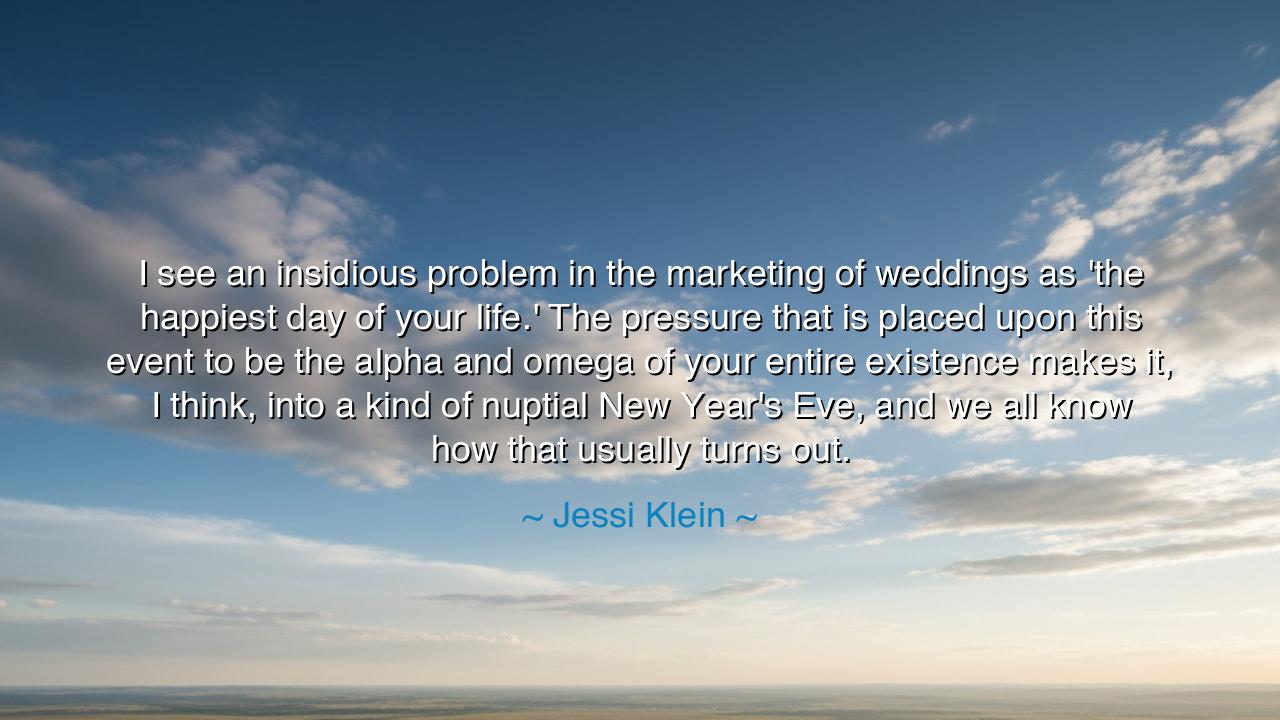
I see an insidious problem in the marketing of weddings as 'the
I see an insidious problem in the marketing of weddings as 'the happiest day of your life.' The pressure that is placed upon this event to be the alpha and omega of your entire existence makes it, I think, into a kind of nuptial New Year's Eve, and we all know how that usually turns out.






The words of Jessi Klein—“I see an insidious problem in the marketing of weddings as 'the happiest day of your life.' The pressure that is placed upon this event to be the alpha and omega of your entire existence makes it, I think, into a kind of nuptial New Year's Eve, and we all know how that usually turns out.”—are a warning against illusion disguised as celebration. They remind us that when weddings are burdened with the weight of perfection, they become less about love and more about performance. In such expectation lies disappointment, for no single day can bear the totality of a life.
This utterance speaks to the tyranny of false ideals. When society declares that the wedding must be the “happiest day,” it plants seeds of fear in the hearts of those who wed. The couple, instead of rejoicing freely, trembles beneath the pressure of spectacle, worried that every flower, every gesture, every smile must be flawless. Klein likens this to New Year’s Eve, another moment inflated by expectation, where joy often gives way to anticlimax. Her wisdom is this: joy cannot be manufactured by decree, but must arise naturally, from love itself.
History offers a parallel in the court weddings of Marie Antoinette and Louis XVI. Their union was staged as a glittering spectacle, designed to dazzle the world. Yet beneath the gold and music, the marriage faltered, the kingdom groaned, and the grandeur that was meant to signal eternal joy became, instead, a prelude to ruin. The lesson endures: when a wedding becomes a show for others, its true purpose—the sacred joining of two hearts—is obscured.
The quote also reminds us of the continuity of life beyond the day. A wedding is not the “alpha and omega,” not the beginning and the end, but a single note in the long song of a shared existence. To treat it as the summit of happiness is to forget that the real labor and joy of love comes in the days, years, and decades that follow. True happiness is not found in one day of perfection, but in the thousand imperfect days lived with devotion.
Let this be the lesson carried forward: do not let the world’s marketing of weddings steal the true joy of the moment. Cast aside the weight of impossible expectations, and embrace the day for what it is—a beginning, not an end; a promise, not a performance. As Jessi Klein warns, when we release the illusion of “the happiest day,” we discover something greater: the enduring happiness that comes not from spectacle, but from love lived daily, humbly, and authentically.






KCTram Thi Kim Chi
This makes me think about how consumer culture amplifies emotional expectations. The more money and meaning we attach to one event, the harder it is for reality to live up to the fantasy. Maybe weddings would be more fulfilling if we treated them as a reflection of love rather than a competition for validation. Why do we keep confusing significance with spectacle?
AQNguyen An Quy
There’s a striking honesty in this statement. The idea that 'the happiest day of your life' must happen on a specific day feels almost cruel. What if someone’s wedding isn’t perfect—does that mean they’ve failed? I think this pressure robs people of the beauty of imperfection. Shouldn’t happiness be a journey rather than a single, flawless performance?
GNNgo Tran Gia Nhu
This resonates deeply with me. Weddings are supposed to be about love, but they often become a public performance of perfection. It’s ironic that an event meant to symbolize connection can end up creating stress and comparison. I wonder if we’ve forgotten how to celebrate authentically without turning every moment into something that needs to be captured, shared, and approved by others.
MDMike Duonq
I love this quote because it captures the emotional trap of idealization. The wedding industry sells happiness as a product, which creates anxiety rather than joy. It makes me wonder—when did celebrating love turn into staging an event? Maybe if we stopped expecting one day to define our entire future, we’d actually enjoy it more and focus on the marriage instead of the spectacle.
LNnguyen lien nhi
This observation feels incredibly real. There’s so much societal pressure to make a wedding 'perfect' that it often overshadows the actual purpose—celebrating love and partnership. I completely understand the comparison to New Year’s Eve; the higher the expectations, the easier it is to feel disappointed. Why do we keep turning genuine milestones into performance events rather than letting them simply be meaningful moments?